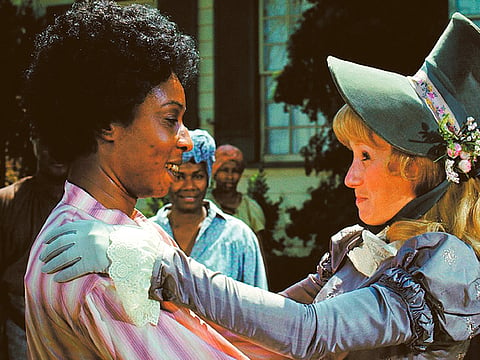‘Roots’ stars look back on making this TV classic
The series was an eight-part epic based on Alex Haley’s best-seller that told the saga of his family tree

ABC bosses weren’t sure anyone would watch.
Their ambitious miniseries Roots was an eight-part epic based on Alex Haley’s best-seller that told the saga of his family tree, beginning with Kunta Kinte, a West African teen captured by slave raiders then shipped to America in the mid-1700s, and continuing through the Civil War.
Suffering cold feet, ABC decided to get it over with on consecutive nights in January 1977, where, if no one tuned in, it would do the least harm to the network’s ratings.
But as everyone knows, Roots exploded as a TV and social phenomenon, averaging 80 million viewers each night and opening the eyes of millions to a painful swath of history too often overlooked or forgotten.
In time for its 40th anniversary next year, Roots: The Complete Original Series is being re-released on June 7 on Blu-ray by Warner Bros. Home Entertainment, and, starting Monday, can be purchased for high-def download from online retail sites.
On the eve of this remastered release (and a four-part remake premiering May 30 on the History channel), a trio of stars from the original Roots gathered this week to look back. Here, edited for length, is their conversation:
“On the set,” recalled Leslie Uggams, 72, who played Kunta Kinte’s daughter Kizzy, “there was an energy that I had never experienced before. It was like magic.”
“For me, being on the set was almost sacred,” echoed Ben Vereen, 69, who played Kizzy’s son, Chicken George.
“We knew the story. We’d always told the story,” said 79-year-old Louis Gossett Jr., who played Fiddler. “But to have it on worldwide television was special!”
“I watched it on television like everybody else,” said Vereen. But he didn’t grasp its impact until arriving at an American Music Awards event where fellow presenter Merv Griffin congratulated him.
“I didn’t know what he was talking about, and the curtain opened and there was a standing ovation, and I was clapping for Merv, who said, ‘No, that’s for YOU, Chicken George!’”
“I was in Las Vegas working in a musical,” said Uggams, “and I get a phone call from Ann-Margret: ‘Leslie, we had to change the time for my show. Everybody was staying in.’ Room service?! You couldn’t get room service, because everybody was watching ‘Roots’!”
No one could have dreamed of such a reception.
“We can’t predict,” said Gossett. “We just have to do the best thing we can, commit to God or Allah or whoever, do the next blessed thing, and leave the results to him.”
Vereen: “And show up!”
Uggams: “Show up!”
But showing up meant taking part in some horrific scenes. Gossett recalled co-star and pal Vic Morrow feeling obliged to apologise for the scene where, as the plantation’s slave master, he orders Kunta Kinte to be savagely whipped. He told Gossett, “I’ve got to say I’m sorry in advance.”
“It wiped you out,” agreed Vereen.
“Like the scene where I” — as the slave girl Kizzy — “got put in the wagon and taken away,” said Uggams.
And Vereen cited the cockfighting scene where he’s told that if his chicken wins, he would be set free: “My whole life depended on that chicken winning that fight. And he died! And I picked up that chicken and said, ‘At least YOU’RE free.’”
“I would have been eating chicken ever since,” cracked Gossett, and the threesome rocked with laughter.
The point of dramatising the cruelty and hardships suffered by blacks isn’t to stir up rage at these injustices, said Gossett, but to shed light on this chapter of the black experience in the spirit of reaching an opposite response.
“We have to throw away the resentments and the anger,” he said. “I think the word is forgiveness. Those lessons become an integral part of the diversity of this country and the world, and it’s desperately needed.”
“That’s the great thing that happened with Roots,” said Uggams. “It opened up the dialogue. I had people coming up to me and saying, ‘Oh my God! We didn’t KNOW!’”
“Not to separate, but to humanise,” said Vereen, who likened black slavery to the holocaust in Nazi Germany. “ALL people have gone through some sort of holocaust.”
With that in mind, they all endorsed the new version of “Roots.”
“This is another generation it’s speaking to,” said Vereen, “and if they like it, they’ll go back and watch the original. We need to continue this dialogue until we learn the lesson.”
“And not run from it,” said Uggams.
They all said they plan to watch.
“Of course!” said Gossett.
“Are you kidding?” said Uggams. “I want to see what they’re doing!”
“And 50 years from now,” Vereen said, “there’ll be ANOTHER remake.”
“And we’ll be THERE,” said Uggams with a smile.



